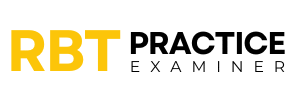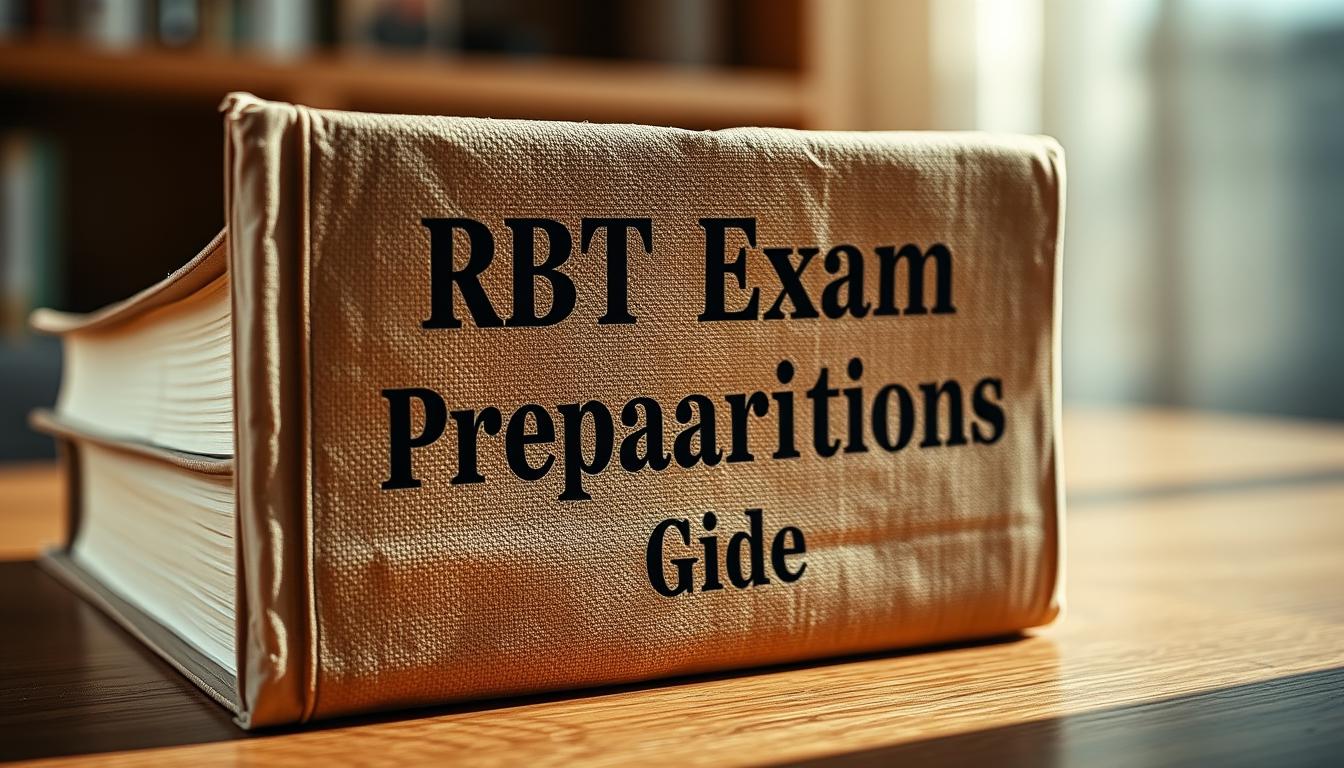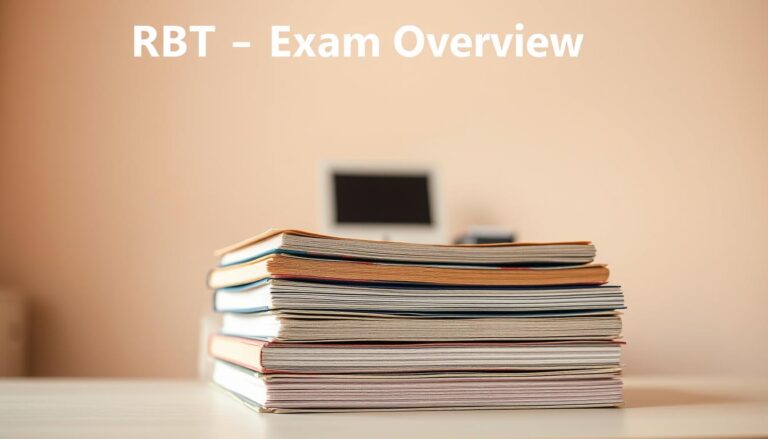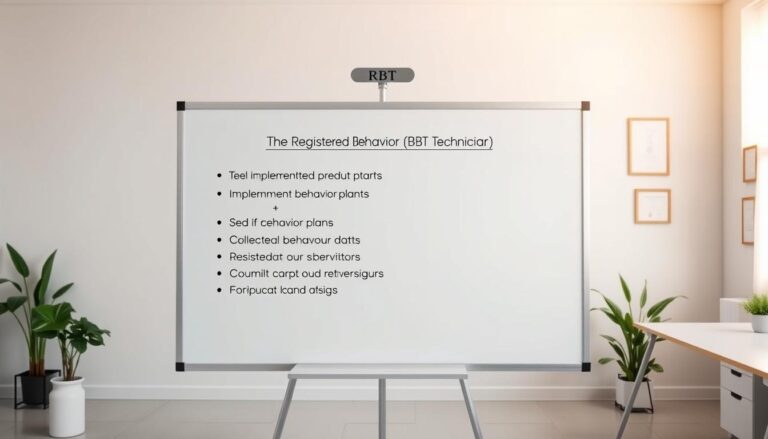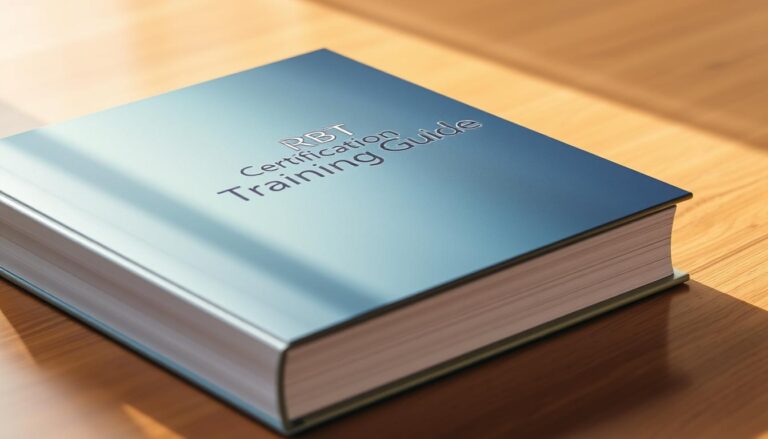Preparing for the RBT Exam: Is It Difficult? Tpis for Easy
Becoming a Registered Behavior Technician (RBT) is an exciting career path in applied behavior analysis. Many aspiring professionals wonder about the RBT exam difficulty level. They question if the certification process is challenging to navigate.
The RBT exam may seem intimidating at first. But with strategic preparation, you can significantly improve your chances of success. Understanding the is RBT exam hard aspects helps candidates approach their certification with confidence and clarity.
Certification as an RBT opens doors to meaningful work in behavioral therapy. This is true for individuals with autism and developmental disabilities. The exam tests essential skills and knowledge needed to provide high-quality behavioral intervention services.
Our guide will break down the exam preparation process. It offers practical insights and strategies to help you approach the RBT certification with assurance. We’ll explore study techniques, exam structure, and practical tips that demystify the certification journey.
Whether you’re a recent graduate or a professional seeking to expand your career opportunities, this guide will provide the roadmap you need. It will help you successfully navigate the RBT exam and launch your career in behavioral therapy.
Understanding the RBT Exam Structure and Format
To prepare for the RBT exam, you need to know its structure and format. The Registered Behavior Technician (RBT) exam is key for those starting in applied behavior analysis. A good rbt exam study guide is essential for success.
The exam tests your knowledge and practical skills in behavior analysis. A well-planned study approach can greatly boost your chances of passing.
Exam Duration and Question Types
The RBT exam has a specific structure:
- Total exam time: 90 minutes
- Number of questions: 75 multiple-choice questions
- Passing score: 80% (minimum 60 correct answers)
Core Content Areas
Focus on these main areas:
| Content Area | Percentage of Exam |
|---|---|
| Measurement | 20% |
| Assessment | 20% |
| Skill Acquisition | 20% |
| Behavior Reduction | 20% |
| Documentation and Professionalism | 20% |
Scoring Methodology
The RBT exam scores you based on your understanding of behavior analysis. Each question is equally important. So, it’s important to study well in all areas.
Knowing the exam’s structure is key to your study guide. Those who prepare thoroughly and understand the format will do best.
Is RBT Exam Hard? Breaking Down the Reality
Many people who want to be Registered Behavior Technicians wonder if the RBT exam is tough. The truth is, the exam is challenging but can be passed with good preparation. Knowing if the RBT exam is hard needs a detailed look.
The RBT exam checks if you know a lot about applied behavior analysis, ethics, and being a professional. It’s tough, but it makes sure people with behavioral needs get good care.
- Exam difficulty ranges from moderate to challenging
- Requires solid understanding of behavioral intervention techniques
- Tests both theoretical knowledge and practical application
What makes the RBT exam hard includes:
- Comprehensive content coverage
- Detailed assessment of professional skills
- Practical scenario-based questions
- Time management challenges
Don’t let the thought that the RBT exam is hard scare you. Good preparation, steady study, and hands-on training can help you pass. Most people who study hard and practice a lot can pass the exam.
How hard the RBT exam is depends on your background, how well you prepare, and how much you want to learn. With hard work and a clear plan, you can pass the exam and become a healthcare professional.
Essential Requirements Before Taking the RBT Exam
To prepare for the RBT exam, you must meet several key requirements. Aspiring Registered Behavior Technicians need to fulfill educational and professional criteria. This makes them eligible for certification.
Those aiming to pass the RBT exam must know the essential requirements. These show they are ready for this professional certification. They ensure candidates have the skills and knowledge needed for applied behavior analysis.
Educational Prerequisites
The path to RBT certification includes specific foundational steps:
- Minimum age of 18 years
- High school diploma or equivalent
- Ability to read, write, and understand English
- Basic understanding of behavioral principles
Training Requirements
For RBT exam prep, candidates need thorough training. They must finish a 40-hour program on key behavioral intervention techniques:
- Complete a BACB-approved training course
- Receive direct supervision from a Board Certified Behavior Analyst (BCBA)
- Document training hours with an authorized supervisor
- Demonstrate practical skills in behavioral intervention
Background Check Process
Professional integrity is vital in behavioral health. The background check process includes:
- Criminal background screening
- Verification of personal history
- Review of professional references
- Compliance with ethical standards
Preparing for the RBT exam requires careful attention to these prerequisites. By meeting these requirements, candidates show their dedication to professional excellence in behavioral intervention.
Key Components of RBT Exam Preparation
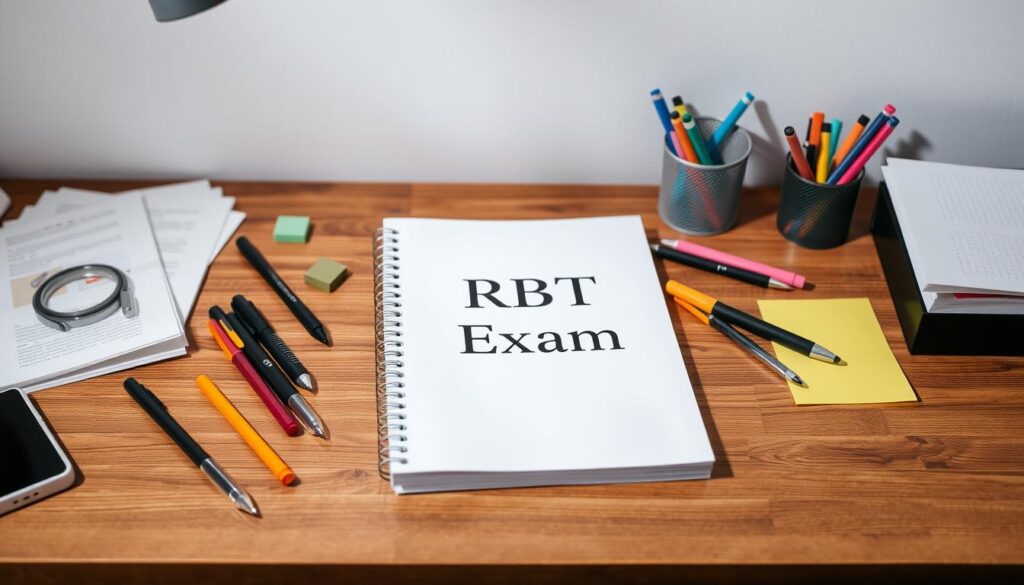
To pass the Registered Behavior Technician (RBT) exam, you need a solid plan. It’s key to make a study plan that works for you. Your study guide should cover many ways to learn, making sure you’re well-prepared.
Important parts of getting ready for the RBT exam include:
- Creating a study schedule
- Finding good study materials
- Practicing with sample questions
- Learning about key behavior principles
When getting ready for the RBT exam, aim to understand deeply, not just memorize. Get to know the basics of applied behavior analysis to build a strong knowledge base.
Your study plan should include:
- Looking over BACB (Behavior Analyst Certification Board) materials
- Using online practice exams
- Joining study groups
- Getting advice from seasoned RBTs
Managing your time well is vital. Set aside hours each week for studying, breaking down hard topics into smaller parts. Practice tests can show where you need to improve and boost your confidence.
It’s not just about knowing how to do things; understanding why is also key. This deeper understanding will help you during the exam and in your career.
Most Challenging Topics in the RBT Exam
The RBT exam can seem tough to many. Knowing the hard parts is key to getting ready and doing well. It’s all about studying smart and really understanding the material.
So, is the RBT exam hard? Yes, it is, but you can get through it by focusing on the tough spots. These areas test your knowledge and how you apply it.
Behavioral Assessment Challenges
Behavioral assessment is a big challenge in the RBT exam. Students often find it hard to:
- Spot complex behaviors
- Use detailed observation methods
- Tell different behaviors apart
Measurement Techniques
Getting good at measurement needs a lot of focus. The hard parts include:
- Collecting data accurately
- Graphing behavior data
- Understanding what the data means
| Topic | Difficulty Level | Study Recommendation |
|---|---|---|
| Behavioral Assessment | High | Practice observation skills |
| Measurement Techniques | Medium-High | Focus on data interpretation |
| Ethics and Conduct | Medium | Review professional guidelines |
Ethics and Professional Conduct
Understanding ethics is critical. It’s about knowing right from wrong and making good choices. You need to show:
- Good judgment
- Keeping client secrets
- Knowing professional limits
Getting good at these hard topics takes hard work, practice, and a smart study plan. It’s all about diving deep into the world of behavior intervention.
Effective Study Strategies for RBT Success
Getting ready for the RBT exam needs a smart study plan. Knowing the right tips and tricks is key to passing. A solid study plan can really boost your chances of doing well.
Here are some top study strategies for the RBT exam:
- Make a study schedule to keep your time organized
- Use active recall to help remember what you learn
- Try spaced repetition to keep learning over time
- Make concept maps to see how ideas connect
Choosing the best study tools and methods is important. How to succeed in rbt exam means knowing how you learn best and tailoring your study plan to fit.
| Study Strategy | Effectiveness Rating | Time Investment |
|---|---|---|
| Flashcard Method | High | 30-45 minutes daily |
| Practice Exams | Very High | 1-2 hours weekly |
| Group Study Sessions | Moderate | 2-3 hours weekly |
Studying with others can be helpful. Join online forums or local groups to share tips and get motivated. Practice exams are great for getting a feel for the exam and spotting weak spots.
- Use digital flashcards for easy studying
- Watch videos from certified RBTs for extra learning
- Take mock exams to boost your confidence
Your study plan should mix learning the material with applying what you learn. Stay on track, stay focused, and go into the RBT exam feeling confident.
Common Mistakes to Avoid During RBT Exam Preparation
Getting ready for the Registered Behavior Technician (RBT) exam needs careful planning. Many people struggle because of common mistakes. These can be avoided with the right tips for passing the RBT exam.
To do well in RBT exam prep, it’s important to know and avoid challenges. Spotting these mistakes early can greatly boost your success chances.
Time Management Errors to Sidestep
Managing your time well is key for RBT exam prep. Students often make big mistakes that hurt their study time:
- Putting off studying until the last minute
- Having an irregular study schedule
- Not making a clear study plan
- Ignoring practice tests and mock exams
Navigating Study Material Selection
Picking the right study materials is vital for exam prep. Important things to think about include:
- Choosing materials that are current and BACB-approved
- Avoiding old or incomplete study guides
- Using different learning resources
- Choosing quality over a lot of study materials
Mastering the Practice Test Approach
Practice tests are a big part of RBT exam prep. Good test-taking is more than just answering questions. You should:
- Practice under real exam conditions
- Look closely at wrong answers
- Find and fix knowledge gaps
- Get more confident with regular practice
By using these strategies, you can avoid common mistakes. This way, you can go into the RBT exam feeling confident and well-prepared.
RBT Exam Day: What to Expect and How to Prepare

Getting ready for the RBT exam can seem daunting. But, with the right strategy, you can feel confident and prepared. The day of the exam needs careful planning and preparation to succeed.
Before you go to the exam, make sure you have all the right documents. You will need:
- Valid government-issued photo ID
- Exam confirmation letter
- Proof of RBT training completion
Time management is key when preparing for the RBT exam. Arrive at the testing center at least 30 minutes early. This helps you finish check-in and reduces stress. Bring important items like:
- Wear comfortable clothing
- Bring a water bottle
- Pack light snacks for energy
Pro tip: Practice deep breathing techniques to calm nerves before entering the exam room. Most testing centers have strict rules about personal items. Check the guidelines to avoid any issues.
During the exam, manage your time well. Read each question carefully and mark hard ones to come back to. Remember, good preparation is essential for doing well on the RBT exam.
Best Resources and Study Materials for the RBT Exam
Getting ready for the RBT exam needs a smart plan for picking study materials. Those who pass know that a detailed rbt exam study guide is key. The right tools can change how you learn and make you feel more confident.
Finding the best study materials can be tough. We’ve picked out the top resources to help with your rbt exam prep. They are designed to help you do well.
Recommended Textbooks
- Cooper Applied Behavior Analysis – A detailed book on ABA basics
- Mayer, Sulzer-Azaroff, and Wallace Behavior Analysis for Lasting Change
- Behavior Intervention Manual – A practical guide for intervention methods
Online Study Platforms
| Platform | Key Features | Price Range |
|---|---|---|
| Behavior Analyst Certification Board (BACB) Portal | Official practice materials, task list alignment | $50-$150 |
| RBT Exam Prep | Interactive modules, practice questions | $75-$200 |
| Autism Certification Center | Comprehensive online training | $100-$250 |
Practice Exam Resources
- BACB Official Practice Exam
- Behavior Development Solutions Mock Exams
- RBT Exam Prep Online Practice Tests
Choosing good study materials is key to passing the RBT exam. Pick resources that match the BACB task list and cover all important behavioral analysis topics.
Time Management Techniques for Exam Success

Mastering time management is key when getting ready for the RBT exam. Good strategies can boost your success chances and lower test anxiety. These tips will help you tackle the exam with confidence.
Creating a strategic time management plan is essential. It involves making a study plan that breaks down your prep into smaller parts. This method helps avoid feeling overwhelmed and ensures steady progress in your RBT exam prep.
- Create a detailed study schedule
- Prioritize challenging content areas
- Practice timed mock exams
- Use active learning techniques
When it’s time for the actual exam, managing your time is even more important. Use these practical tips to do your best:
- Read each question carefully but quickly
- Mark difficult questions to review later
- Allocate specific time blocks for each section
- Leave time for final review
| Time Management Strategy | Exam Preparation Impact |
|---|---|
| Structured Study Schedule | Reduces stress, improves retention |
| Timed Practice Tests | Builds exam confidence, improves speed |
| Strategic Question Approach | Maximizes your score |
Remember, successful time management is about working smarter, not just harder. By using these techniques, you’ll be ready to face the RBT exam with precision and calm.
Managing Test Anxiety and Stress
Getting ready for the RBT exam can make you feel really stressed and anxious. It’s important to know how to handle these feelings to do well. Learning the right tips and tricks can make studying easier and boost your confidence.
Test anxiety often comes from fear of the unknown. It’s key to develop strong mental strategies to tackle this. Experts suggest several effective ways to fight exam stress.
- Practice deep breathing exercises to calm nervous system
- Create a structured study schedule
- Use positive visualization techniques
- Maintain consistent sleep patterns
- Engage in regular physical exercise
Mental prep is more than just studying. Mindfulness meditation can reduce anxiety and improve focus. Just 10-15 minutes a day of relaxation techniques can lower stress a lot.
What you eat also affects your stress levels. Eating balanced meals, staying hydrated, and avoiding too much caffeine can keep your mood and energy stable. Adding foods like nuts, fish, and berries to your diet can help too.
Experts say making a stress management plan is a good idea. This lets you figure out what makes you anxious and find ways to deal with it. It’s all about making a plan that works for you during your RBT exam prep.
Real Experiences: Success Stories and Lessons Learned
Getting through the RBT exam can be tough. But, real-life stories give us great tips on how to pass. People who are trying to become Registered Behavior Technicians can learn from both winners and those who had to try again.
Inspiring Testimonials from Certified RBTs
Stories of RBT success show the importance of hard work. Many certified experts say the same things helped them pass:
- Sticking to a study plan
- Using many study tools
- Practicing with mock exams
- Being part of study groups and forums
Learning from Challenging Attempts
Not everyone gets certified right away. Those who didn’t pass at first share important lessons:
- Managing your time well is key
- It’s not just about memorizing
- Staying calm and focused is important
- Getting advice from mentors helps
Setbacks are chances to learn and grow. Candidates who keep trying and plan well are more likely to pass.
Creating a detailed study plan, staying calm, and staying positive are key. Every experience, whether it’s a win or a try again, teaches us something valuable.
Conclusion
Getting through the RBT exam might seem tough, but it’s doable with the right prep. Many ask if the RBT exam is hard. But, with good study and the right strategy, it becomes a step towards your career in behavioral therapy.
Mastering the RBT exam starts with thorough preparation. Use the tips we’ve shared, like practicing with tests and managing your study time. Also, grasp the core behavioral concepts. This will boost your confidence and skills for the certification.
Being a Registered Behavior Technician is more than just passing a test. It’s about using your skills to help others. Your hard work, growth, and commitment to ethics will show in your success in this field.
Start your journey, stay focused, and believe in your prep. Becoming a certified RBT is tough but rewarding. It lets you make a real difference in people’s lives with autism and developmental disabilities.
